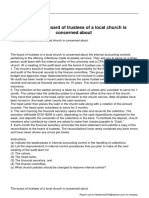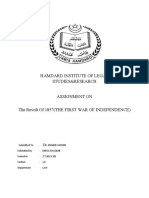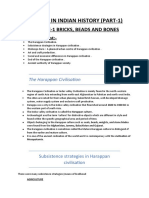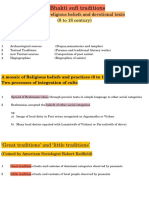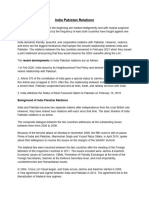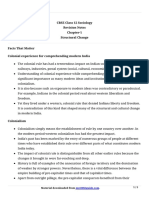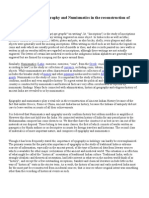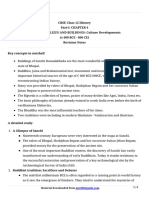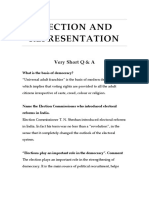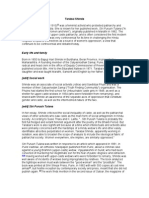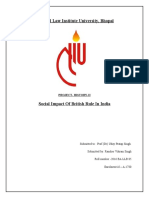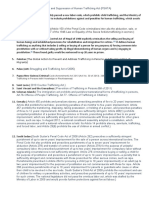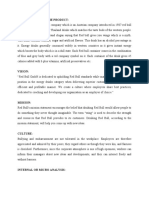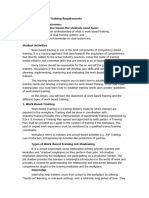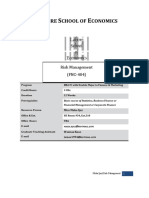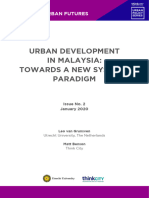History Project-Synopsis
History Project-Synopsis
Uploaded by
Ransher Vikram SinghCopyright:
Available Formats
History Project-Synopsis
History Project-Synopsis
Uploaded by
Ransher Vikram SinghOriginal Title
Copyright
Available Formats
Share this document
Did you find this document useful?
Is this content inappropriate?
Copyright:
Available Formats
History Project-Synopsis
History Project-Synopsis
Uploaded by
Ransher Vikram SinghCopyright:
Available Formats
National Law Institute University, Bhopal
PROJECT SYNOSIS - HISTORY-II
ECONOMIC IMPACT OF THE BRITISH RULE IN INDIA
A. Aim and Objectives;
To study all aspect of British Economic policy in India,
To study instances of discriminatory policies towards Indians,
To study the wealth drain and Economic slowdown of Indians under the Raj.
B. Introduction;
The economic policies followed by the British led to the rapid transformation of India’s economy
into a colonial economy whose nature and structure were determined by the needs of the British
economy. In this respect the British conquest of India differed from all previous foreign
conquests. he previous conquerors had overthrown Indian political powers, but had made no
basic changes in the country’s economic structure; they had gradually become a part of Indian
life, political as well as economic. The peasant, the artisan and the trader had continued to lead
the same type of existence as before The basic economic pattern that of the self-sufficient rural
economy, had been perpetuated. Change of rulers had merely meant change in the personnel of
those who appropriated the peasant’s surplus. But the British conquerors were entirely different.
They totally disrupted the traditional structure of the Indian economy. Moreover, they never
became an integral part of Indian life. They always remained foreigners in the land, exploiting
Indian resources and carrying away India’s wealth as tribute. The results of this subordination of
the Indian economy to the interests of British trade and industry were many and varied.
C. Research Methodology used;
Research papers, Books and Online resources.
D. Project Plan;
The project would be divided into different areas of economic impact ;
1) Disruption of the Traditional Economy
2) Ruin of Artisans and Craftsmen
3) Impoverishment of the Peasantry
4) Ruin of Old Zamindars and Rise of New Landlordism
5) Stagnation and Deterioration of Agriculture
6) Development of Modern Industries
7) Poverty and Famines.
E. Conclusion
The basic fact is that the same social, political and economic processes that produced industrial
development and social and cultural progress in Britain also produced and then maintained
economic underdevelopment and social and cultural backwardness in India.
The reason for this is obvious. Britain subordinated the Indian economy to its own economy and
determined the basic social trends in India according to her own needs.
The result was stagnation of India’s agriculture and industries, exploitation of its peasants and
workers by the zamindars, landlords, princes, moneylenders, merchants, capitalists and the
foreign government and its officials, and the spread of poverty, disease and semi-starvation.
Submitted to : Prof.(Dr) Uday Pratap Singh.
Submitted by: Ransher Vikram Singh
Roll number -2016 BA LLB 85
Enrolment id – A-1368
You might also like
- L-2nd Sem (Eng Notes) Indian Legal HistoryDocument53 pagesL-2nd Sem (Eng Notes) Indian Legal HistoryAnkita SNo ratings yet
- s6 Enterpreneurship Paper One Uace Internal Mocks Examination 2020 Kings College BuddoDocument2 pagess6 Enterpreneurship Paper One Uace Internal Mocks Examination 2020 Kings College Buddokabugho aisha100% (3)
- CBSE Class 12 History Bricks Beads Bones Harappan CivilizationDocument10 pagesCBSE Class 12 History Bricks Beads Bones Harappan Civilizationmonika singhNo ratings yet
- M.N RoyDocument12 pagesM.N RoyAayush100% (2)
- Book Review of The Indian Constitution-The Corner Stone of The Nation by Granville AustinDocument8 pagesBook Review of The Indian Constitution-The Corner Stone of The Nation by Granville AustinSaba Afreen0% (1)
- Vinamilk'SCMDocument63 pagesVinamilk'SCMTrinh Hai AnhNo ratings yet
- PDF To DocsDocument72 pagesPDF To Docs777priyankaNo ratings yet
- The Board of Trustees of A Local Church Is Concerned AboutDocument2 pagesThe Board of Trustees of A Local Church Is Concerned AboutAmit PandeyNo ratings yet
- Class 12 History Notes Chapter 2Document5 pagesClass 12 History Notes Chapter 2Ahsas 6080No ratings yet
- Kautilya:: Arthashastra Means The Science (Sastra) of Wealth/earth/polity (Artha) - Artha' However Is BitDocument12 pagesKautilya:: Arthashastra Means The Science (Sastra) of Wealth/earth/polity (Artha) - Artha' However Is BitZahid HassanNo ratings yet
- Class 12th History - Kinship Caste and ClassDocument47 pagesClass 12th History - Kinship Caste and ClassRamita Udayashankar100% (1)
- CNI - Topic Wise PYQsDocument2 pagesCNI - Topic Wise PYQssakshi ugaleNo ratings yet
- Sources of HistoryDocument20 pagesSources of Historyanshu15700 omp0% (1)
- Cultural Contribution of Vijayanagara EmpireDocument12 pagesCultural Contribution of Vijayanagara EmpireSandeep Chaturvedi0% (1)
- The Structure of Society in MahabharataDocument8 pagesThe Structure of Society in MahabharataSushant KishoreNo ratings yet
- Swadeshi and RadicalsDocument27 pagesSwadeshi and RadicalsAshishNo ratings yet
- CH 5-WPS OfficeDocument5 pagesCH 5-WPS OfficeApoorv jainNo ratings yet
- Nomadic EmpiresDocument9 pagesNomadic EmpiresSahanaNo ratings yet
- Theme 6 Bhakti-Sufi Traditions Lesson NotesDocument13 pagesTheme 6 Bhakti-Sufi Traditions Lesson NotesDPS MUN JODHPURNo ratings yet
- MAHATMA GANDHI-The National Movement and The Quit India MovementDocument7 pagesMAHATMA GANDHI-The National Movement and The Quit India MovementOnline Subs100% (1)
- Non-Cooperation Movement by - Ayush Mani MishraDocument6 pagesNon-Cooperation Movement by - Ayush Mani Mishraanon_579871068100% (1)
- Colonialism and The CountrysideDocument15 pagesColonialism and The CountrysideRamita Udayashankar83% (6)
- CBSE Class 12 History Part-I: CHAPTER 2 KINGS, FARMERS AND TOWNS: Early States and Economics (C 600 BCE - 600 CE) Revision NotesDocument9 pagesCBSE Class 12 History Part-I: CHAPTER 2 KINGS, FARMERS AND TOWNS: Early States and Economics (C 600 BCE - 600 CE) Revision NotesAnshuman GuptaNo ratings yet
- 12 History Key Notes CH 01 Bricks Beads and BonesDocument2 pages12 History Key Notes CH 01 Bricks Beads and BonesAbhinav Swaraj67% (6)
- Class 11 Map WorkDocument10 pagesClass 11 Map Workpurv agarwalNo ratings yet
- Hamdard Institute of Legal Studies&ResearchDocument10 pagesHamdard Institute of Legal Studies&ResearchMirza SaquibNo ratings yet
- Theme 5 - Through The Eyes of Travellers Perceptions of Society (C.Tenth To Seventeenth Century) (Lesson Notes) IntroductionDocument10 pagesTheme 5 - Through The Eyes of Travellers Perceptions of Society (C.Tenth To Seventeenth Century) (Lesson Notes) Introductionsayooj tvNo ratings yet
- An Empire Across Three ContinentsDocument5 pagesAn Empire Across Three ContinentsRamita Udayashankar67% (12)
- NS12 Ch5 .Through The Eyes of Travellers Perceptions of SocietyDocument6 pagesNS12 Ch5 .Through The Eyes of Travellers Perceptions of SocietyBADRI NARAYANA.KNo ratings yet
- Tripartite Struggle PDFDocument35 pagesTripartite Struggle PDFSubhojeet Naskar100% (2)
- CBSE Class 11 History WorksheetDocument1 pageCBSE Class 11 History Worksheetrishichauhan25No ratings yet
- Continue: Brahmanic and Shramanic Political Thought PDFDocument3 pagesContinue: Brahmanic and Shramanic Political Thought PDFAkshay Mishra100% (2)
- Origin of Untouchables Sem1Document15 pagesOrigin of Untouchables Sem1Mounika Kalakoti100% (1)
- Bricks, Beads and BonesDocument9 pagesBricks, Beads and BonesKaruna MauryaNo ratings yet
- NON-COOPERATION MOVEMENT NadeemDocument14 pagesNON-COOPERATION MOVEMENT NadeemUMANG COMPUTERSNo ratings yet
- CHP 7. Rise of British Power in BengalDocument9 pagesCHP 7. Rise of British Power in BengalS DsouzaNo ratings yet
- 6 Bhakti Sufi Traditions: Main SourcesDocument30 pages6 Bhakti Sufi Traditions: Main Sourcesharsh kumarNo ratings yet
- The Gupta EmpireDocument25 pagesThe Gupta Empireparijat_96427211100% (2)
- Alternative Centres of PowersDocument34 pagesAlternative Centres of PowersJoe SteveNo ratings yet
- The Golden Age of GuptasDocument17 pagesThe Golden Age of GuptasVrindaNo ratings yet
- Bardoli SatyagrahaDocument8 pagesBardoli Satyagrahaashish100% (2)
- Making of A Composite Culture - PresentationDocument9 pagesMaking of A Composite Culture - PresentationTarun Sharma0% (1)
- India Pakistan RelationsDocument8 pagesIndia Pakistan Relationsvivek pandita100% (1)
- 12 Political Science-Democratic ResurgenceDocument13 pages12 Political Science-Democratic ResurgenceMd Shami100% (1)
- CBSE Class 11 Political Science Sample Paper 01 (2019-20) : Material Downloaded From - 1 / 16Document16 pagesCBSE Class 11 Political Science Sample Paper 01 (2019-20) : Material Downloaded From - 1 / 16NihalSoniNo ratings yet
- Historical Background of Indian Constitution NotesDocument9 pagesHistorical Background of Indian Constitution NotesSri Krishna Bharadwaj Godavari100% (1)
- CBSE Class 12 Sociology Revision Notes Chapter-1 Structural ChangeDocument5 pagesCBSE Class 12 Sociology Revision Notes Chapter-1 Structural ChangeZainab KhanNo ratings yet
- Epigraphy and NumismaticsDocument3 pagesEpigraphy and Numismaticsspace_0077100% (2)
- CBSE Class 12 History Part-I: CHAPTER 4 THINKERS, BELIEFS AND BUILDINGS: Culture Developments (C 600 BCE - 600 CE) Revision NotesDocument9 pagesCBSE Class 12 History Part-I: CHAPTER 4 THINKERS, BELIEFS AND BUILDINGS: Culture Developments (C 600 BCE - 600 CE) Revision NotesAshish GangwalNo ratings yet
- Class 11 Political Science - Election and RepresentationDocument16 pagesClass 11 Political Science - Election and RepresentationRamita Udayashankar67% (3)
- Kautilya's Saptang Theory of State: Heera Singh Student Id-20185072Document7 pagesKautilya's Saptang Theory of State: Heera Singh Student Id-20185072HEERA SINGH DARDNo ratings yet
- India's Nuclear PolicyDocument24 pagesIndia's Nuclear PolicySonalNo ratings yet
- History Project 1.2Document21 pagesHistory Project 1.2gaurav singh100% (1)
- Tarabai Shinde Tarabai Shinde (1850 - 1910) : Early Life and FamilyDocument6 pagesTarabai Shinde Tarabai Shinde (1850 - 1910) : Early Life and FamilyFardeen WasgareNo ratings yet
- EconomicsDocument14 pagesEconomicsgabbita pavani100% (1)
- Revolt of 1857Document8 pagesRevolt of 1857siddharthNo ratings yet
- Chapter 8 PDFDocument28 pagesChapter 8 PDFHarsh Sharma100% (1)
- Mahatma Gandhi and The Nationalist MovementDocument14 pagesMahatma Gandhi and The Nationalist MovementRamita Udayashankar75% (4)
- (Jainism in Odisha) : A.Mahesh PatroDocument24 pages(Jainism in Odisha) : A.Mahesh PatrosantunusorenNo ratings yet
- Class 12 History Notes Chapter 3 KinshipDocument5 pagesClass 12 History Notes Chapter 3 KinshipAhsas 6080No ratings yet
- Military Reforms of Alauddin KhiljiDocument3 pagesMilitary Reforms of Alauddin KhiljiManishaDhimanNo ratings yet
- Unit 5Document17 pagesUnit 5soumendramahapatra1999No ratings yet
- ADR (Clinical) Unit - 5Document34 pagesADR (Clinical) Unit - 5Ransher Vikram SinghNo ratings yet
- Places To See in BhopalDocument2 pagesPlaces To See in BhopalRansher Vikram SinghNo ratings yet
- Elsa M C C (Emc) WTO L C 2017-2018: Borginia - Measures Affecting Trade in Textile Products (Complainant: Syldavia)Document14 pagesElsa M C C (Emc) WTO L C 2017-2018: Borginia - Measures Affecting Trade in Textile Products (Complainant: Syldavia)Ransher Vikram SinghNo ratings yet
- National Law Institute University, Bhopal: Human RightsDocument23 pagesNational Law Institute University, Bhopal: Human RightsRansher Vikram SinghNo ratings yet
- History Project-Social ImpactDocument13 pagesHistory Project-Social ImpactRansher Vikram SinghNo ratings yet
- ELSA Moot Court Competition 2017 - 2018: Borginia - Measures Affecting Trade in Textile ProductsDocument29 pagesELSA Moot Court Competition 2017 - 2018: Borginia - Measures Affecting Trade in Textile ProductsRansher Vikram SinghNo ratings yet
- Trafficking LawsDocument1 pageTrafficking LawsRansher Vikram SinghNo ratings yet
- Case Analysis of J. R. Parashar V. Prashant BhusanDocument12 pagesCase Analysis of J. R. Parashar V. Prashant BhusanRansher Vikram SinghNo ratings yet
- Labour Law Case AnalysisDocument17 pagesLabour Law Case AnalysisRansher Vikram SinghNo ratings yet
- Need To Evolve Sentencing Policy in Death Penalty CasesDocument17 pagesNeed To Evolve Sentencing Policy in Death Penalty CasesRansher Vikram SinghNo ratings yet
- Finvasia Client Guidance MCX NCDEXDocument17 pagesFinvasia Client Guidance MCX NCDEXShakeel AhmedNo ratings yet
- Commercial Bank OperationsDocument2 pagesCommercial Bank OperationsMeilin Denise MEDRANANo ratings yet
- RED BULL MARKETING STRATERGY-1825 WordsDocument10 pagesRED BULL MARKETING STRATERGY-1825 WordsKeyur NanduNo ratings yet
- Agricultural Marketing-The New ParadigmsDocument62 pagesAgricultural Marketing-The New Paradigmsdonbosskiss100% (1)
- Strategic Analysis: The Process ofDocument9 pagesStrategic Analysis: The Process ofhoooza janaykaNo ratings yet
- Papua New Guinea Investment Format (00-52)Document2 pagesPapua New Guinea Investment Format (00-52)successamechi01No ratings yet
- Weekly Summary2.1Document12 pagesWeekly Summary2.1Ambrish (gYpr.in)No ratings yet
- Unit 4Document10 pagesUnit 4kaicaras16No ratings yet
- RMDocument6 pagesRMAyla ShahoorNo ratings yet
- Company Profile (1) 2Document22 pagesCompany Profile (1) 2Eze ChidiebereNo ratings yet
- Bank Guarantee (Defination)Document15 pagesBank Guarantee (Defination)M Nagesh0% (1)
- Chapter 3 Personal SellingDocument15 pagesChapter 3 Personal SellingRahul BambhaNo ratings yet
- Hotel BusinessDocument10 pagesHotel BusinessNivedita BhaljaNo ratings yet
- 098060115Document75 pages098060115Sagar Paul'gNo ratings yet
- Account Summary Portfolio AllocationDocument22 pagesAccount Summary Portfolio AllocationCourtney JohnsonNo ratings yet
- Summer Training Project On Attrition and RetentionDocument57 pagesSummer Training Project On Attrition and Retentioniweweyuwerfgherguj100% (3)
- 2.mis Case Study JoyDocument3 pages2.mis Case Study JoyJoyae ChavezNo ratings yet
- Swot Analysis of Fast Food IndustryDocument1 pageSwot Analysis of Fast Food IndustryAnupam Maity75% (8)
- Speech OutlineDocument1 pageSpeech OutlineMonica GeronaNo ratings yet
- WK 8-Case 6: Frenkel's Forensics: John Frenkel Qualified As An Accountant in 1978, and He Has AlwaysDocument2 pagesWK 8-Case 6: Frenkel's Forensics: John Frenkel Qualified As An Accountant in 1978, and He Has AlwaysShehryar KhanNo ratings yet
- Accounting Student Revision CardsDocument2 pagesAccounting Student Revision CardsjojoNo ratings yet
- Kita Draft PegununganDocument63 pagesKita Draft PegununganFathin SyifayaniNo ratings yet
- Victoria's Secret PresentationDocument26 pagesVictoria's Secret PresentationThanh TranNo ratings yet
- SCM in RetailingDocument67 pagesSCM in RetailingKaran MagoNo ratings yet
- Issue-2Document12 pagesIssue-2yuszriNo ratings yet
- Economics11 SyllabusDocument4 pagesEconomics11 SyllabusRishab KhandelwalNo ratings yet








